While this blog is all about old films—and the bulk of my film-watching is old films—that doesn’t mean I don’t watch new films. I do; lots of them. But the odd thing is that invariably, new films that I watch end up having some connection (even if in a roundabout way) to an old film.
Last weekend, I watched two new films. One, of course, was the latest big release: The Dark Knight Rises. The other was the 2011 Michael Fassbender-starrer, Centurion. Both films reminded me of one old film, Zulu. Like The Dark Knight Rises, Zulu has Michael Caine in its cast (it was one of his first major film roles). And, like Centurion, Zulu too is about conquered versus conquerors.
Zulu is a British film (directed by Cy Endfield, who produced it along with Stanley Baker), about the Battle of Rorke’s Drift. This battle, fought over the 22nd and 23rd of January, 1879, may not have made it into the realms of the legendary to the extent that the Battle of Balaklava has, or even Leonidas’s stand against Xerxes—but unfairly, perhaps. Because, at the Battle of Rorke’s Drift, just over a hundred men of the 24th Foot Regiment were attacked by an army of 4,000 Zulu warriors.
What resulted was—instead of a wholesale massacre—a near-miracle. Not only did the 24th hold its post, the Battle of Rorke’s Drift set a record as being the event that earned its participants the largest number (eleven) of Victoria Crosses awarded at one time.
This is the story of that seemingly impossible battle.
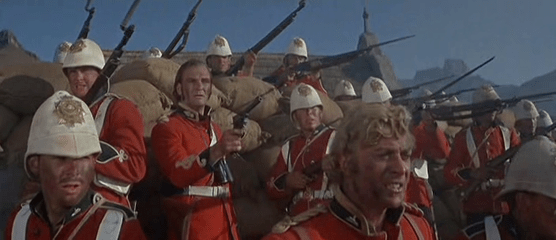
The film begins on 22nd January, 1879. The Battle of Isandlwana has been fought that very morning between the Zulus and the British Army, at the mountain of Isandlwana. The Zulus have been victorious, and the tattered remnants of the British forces under Lord Chelmsford have been forced to retreat as best as they can. Behind them, the Zulus gather up the weapons of the fallen British.

Six miles from Isandlwana is the mission station of Rorke’s Drift. This is a small, fairly sleepy place dominated by a chapel, a tiny hospital adjacent to it, and an enclosure for the station’s cattle. The 24th Regiment, commanded by Lieutenant Gonville Bromhead (Michael Caine), holds the station.
The ‘mission’ and the chapel are within the ambit of a Swedish missionary, Mr Witt (Jack Hawkins). Mr Witt’s daughter Margareta (Ulla Jacobsson) has recently arrived at Rorke’s Drift and finds this all very strange and new.

In fact, it is through the interactions of Margareta, her father and his ‘parishioners’ (as he condescendingly refers to the Zulus) that we first see the aftermath of the Battle of Isandlwana. A vast mass wedding ceremony is being held at a Zulu village, where hundreds of warriors and girls are getting married. Presiding over this celebration is the Zulu chief Cetewayo (played by Chief Mangosuthu Buthelezi, the great-grandson of Cetewayo himself).

Margareta and her father are attending the celebrations, and Mr Witt has to occasionally answer Margareta’s questions—some of them rather embarrassing, because Margareta knows nothing of the Zulus, their cultural beliefs, and their traditions. Her father is more aware, but his awareness doesn’t stop him from being patronising towards the Zulus.
In the midst of this, a messenger arrives with news for Cetewayo—and suddenly, from a wedding party, the crowd changes to a war party. A bewildered Margareta turns to her father, and he manages to find out what has happened. The British have been defeated at Isandlwana, and Cetewayo and his warriors, intoxicated by this victory, have decided to attack the mission station at Rorke’s Drift.

The father and daughter get into their little horse-carriage and flee (a Zulu warrior grabs Margareta, but Cetewayo frees her).
…and, meanwhile, the scene shifts to Rorke’s Drift. The mission station is quiet. Lieutenant Bromhead, elegantly caped, not a hair out of place, and with fly whisk in hand, is out hunting in the hills around.
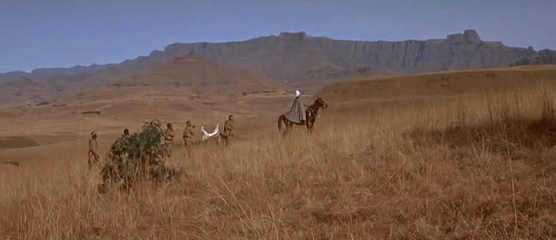
Unknown to him, another officer—a Lieutenant John Chard of the Royal Engineers (Stanley Baker, who also produced the film) —is also in the vicinity. Chard has been sent just that morning to build a bridge across the nearby Buffalo River, and is busy supervising the work.
Bromhead, on his way back to the station, runs into Chard, and the two immediately don’t hit it off.
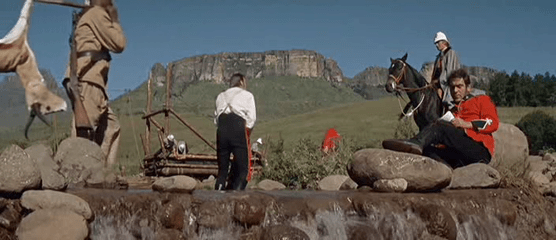
Bromhead is the archetypal foppish upper class gentleman officer, all polite contempt for Chard, whom he addresses as “old boy,” throughout. Even when he asks, with not a trace of apparent anger on his face, “Who said you could use my men?” (since Chard has commandeered some men of the 24th to help in the construction of the bridge).
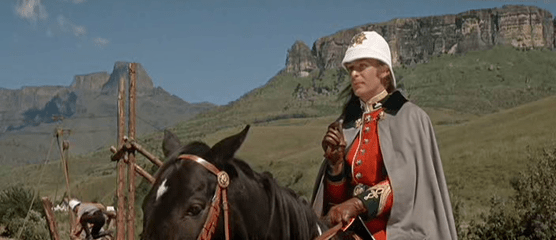
…while Chard is a practical, hard-headed, hands-on soldier (when Bromhead first sees him, Chard is in the river up to his waist, helping build the bridge). Chard obviously dislikes Bromhead as much as Bromhead dislikes him.
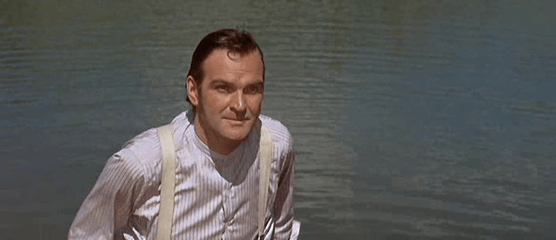
Bromhead, with a final sardonic “Well, chin-chin! Do carry on with your mud pies!” goes off to the station.
And, shortly after, Chard is alerted to the arrival of two men, riding swiftly towards the mission from the direction of the Isandlwana battlefield. Chard gathers his men and takes them back to the station, where they are met by the two arrivals. One of these is Adendorff (Gert Van Den Bergh) of the Natal Native Contingent. He’s been sent with orders for the 24th: to hold their ground.
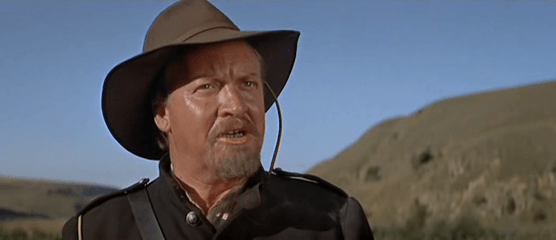
This sparks off an argument between Bromhead and Chard, because while both are lieutenants, Chard has been in the army three months longer. Who will be in command?
But Chard is technically senior, and seems to know more about handling the threat that is looming. Bromhead gives in, though with ill grace.

They are still cold and haughty (on Bromhead’s part) and sarcastic (on Chard’s part) when Mr Witt and Margareta come hurtling back to the mission in their carriage.
… and Mr Witt breaks the awful news: that 4,000 Zulu warriors are headed to the station, to wipe it out. He scurries about, gathering up his belongings and asking Bromhead to have wagons prepared so that the men in the hospital can be evacuated. In Mr Witt’s mind there is no possible room for doubt: the 24th Regiment have to leave, and at once.

Meanwhile, Adendorff explains to Bromhead and Chard how the Zulu attack: in the formation of a fighting bull buffalo.
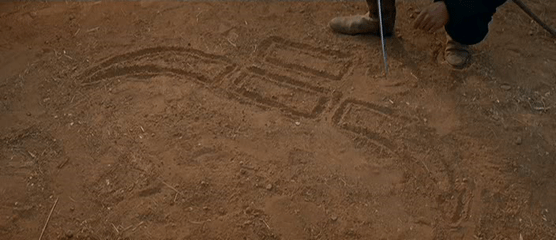
[Interesting bit of trivia: when the film was being made, a Zulu princess was the technical adviser. The diagram she drew on the sand to explain how the Zulus attacked, is the one that was used here].
Adendorff explains that the central section—the ‘head’ of the buffalo—attacks first, but it’s just a feint. The actual attack comes from the vast sweeping ‘horns’ that swing into action, pushing in on the enemy from either side.
There seems no possible chance. The British may be better trained and better armed (the Zulus fight mainly with their assagai spears, no match for the British bayonets), but the sheer inequality in the numbers—100 against 4,000—is mind-boggling.
But both Chard and Bromhead know that they have no option. They have to hold the post.
Fortunately, Chard and Bromhead have Colour Sergeant Bourne (Nigel Green, in a fabulous performance) as their main bulwark. Bourne is the sort of man who can as easily quote scripture to Witt…

…as he can shore up flagging spirits and keep his men going, even when there seems to be no possible hope of survival. He is a hard task master, he will tolerate no nonsense—and yet, he is as tough on himself as he is on his men. If the 24th Regiment are to come through this encounter alive, Bourne will have a big hand in it. And he begins at once, following Chard’s orders to build redoubts, deploy sentries, and set up whatever defences they can.

On the other hand, there is Witt. Witt, who is a pacifist (naturally, perhaps, considering he’s a priest) and who begins raving at the soldiers to not kill. He is also, it emerges, an alcoholic, who downs so much liquor in his panic that Chard is forced to have him locked up.
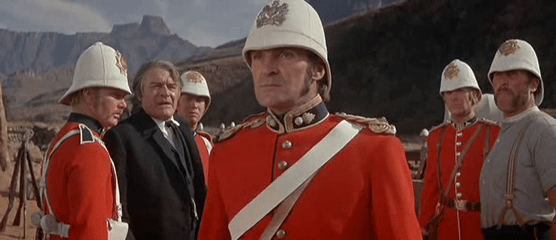
There are men like Private Hook (James Booth), a malingerer who’s in hospital with nothing worse than a boil. Hook scoffs at his colleagues-cum-fellow patients who agree to take up rifles and offer what support they can. To Hook, that’s stupidity. A useless waste of time.

How long will it be before Hook’s cynicism transfers itself to the others? Or before Witt’s repeated quoting of the commandment: “Thou shalt not kill! Thou shalt not kill!” interspersed with his warning that the odds are impossibly stacked against the Brits—take effect? How long will Chard and Bromhead’s tiny group of men hold out against their own growing fear of what comes?
I am a sucker for films based on real life. And I am a sucker for historicals—so the chances of me liking this film were pretty high to begin with. What made me love it was the fact that it wasn’t just one scene after another of a long-ago battle. It was well scripted, well-acted, well presented; and it transported me to a time and place like few other films have been able to do.
As would be apparent from the last sentence, just about everything. The scale of Zulu is massive (the number of Zulus, crowning the mountainside and stretching far into the horizon, in itself is very impressive); the direction, the scripting, the acting—all is excellent. Zulu, in fact, has been listed as one of the best British films ever made. But if I were to name what I liked best about Zulu, it would be:
(a) Nigel Green as Colour Sergeant Bourne. Bourne is a beautifully developed character, and Green’s acting is superb.

(b) The scripting. This is, by Western standards, a long film, clocking in at 138 minutes—but at no point did I find myself yawning and looking to see how much time was left. The story moves at just the right pace: slowly in the beginning, when we’re just getting to know the characters, and then, as the panic mounts, faster and faster.
The second half is all battle, but that too switches scenes: from Chard’s attempts to spread his meagre forces out as effectively as possible, to the hospital, where the patients are creating loopholes so that they can shoot too—to the makeshift hospital Surgeon Reynolds (Patrick Magee) sets up in the chapel, using the altar as an operating table…

(c) The music. And the silences.
The music, first. The background score is good, but what I really loved was the sound of those Zulu singers—and the Welsh voices (the 24th Regiment is depicted as being a Welsh regiment, with—of course, since the Welsh are renowned for their singing—a choir of its own).
Then, the silences. In a war film (in a lot of action films, actually), I’ve seen too many directors fall prey to the temptation to crowd each scene with lots of heart-pounding music. Thankfully, not here. Cy Endfield uses silences beautifully. For instance, the overwhelmingly still, eerie silence of the countryside when the 24th Regiment is waiting for the Zulus to attack. They know thousands of Zulus are coming, just minutes away, but it’s so quiet, it’s almost as if the land itself is holding its breath.
Nothing, really.
My initial viewing had spotted what I thought was a flaw: the Witt character, who seemed to be scripted in a somewhat clichéd way. A hypocritical missionary who preaches pacifism, but mainly as a means to cover his own lack of courage?
But I wouldn’t stand by that initial opinion of mine, either. After all, is lack of courage—especially in a man not a soldier, not required to obey orders to stay and fight—a fault? It’s human to be terrified when you’re facing death. And depicting that terror is not bad scripting; it’s just scripting life the way it is.
Yes, the peace-loving, anti-imperialist side of me, on first watching Zulu, had whispered to me: “You mustn’t like this film. It’s about bloodshed, about the British colonisation of Africa.”
True, it is. And it is.
But it is also a film that ultimately (and I mean ultimately—watch the last couple of scenes) does not preach war; quite the opposite. And while it is about the story of imperialism, it is also, after all, about history. And about a historical event that makes for a damn good story.
Watch. If you at all like historical films, this is one you mustn’t miss.
Little bit of trivia:
Thanks to the apartheid laws in place at the time Zulu was made, Cy Endfield and Stanley Baker were not allowed to pay the Zulu extras the same amount of money they paid the white extras. So the producers got around it by (in addition to the pay) gifting the Zulus all the cattle that were shown in the film (which, considering the value of cattle in Africa, appears to have made up in good part for what the Zulu actors would have otherwise lost out).





Madhu, thanks for this review of this very interesting movie. As another History buff and an unapologetic Anglophile, this is definitely a film I would like to put on my to-watch list. I’m as anti-imperialist as you are, but (I wager, like you) I cannot stand for a white-washing of history – and history provides us with enough evidence of colonisation – what, for instance, can you call our Kings and Emperors, if not colonisers, Imperial powers?
That said, I am no apologist for imperialism either. :) But it was what it was, and whether we liked it or not, it shaped the futures of many nations, including Great Britain’s.
Thanks once again. *Going off to look for a copy.*
LikeLike
Anu, you are so right. It’s easy to criticise the British as imperialists (which they were, I emphatically agree; I also agree that many were pretty brutal in a lot of what they did)… but we tend to forget that – at least in India – they also gave us a lot. Today at lunch (a family get-together), my father and my brother-in-law – ex-cop, and lawyer, respectively – mentioned that the Indian Police Act is from 1861, the Indian Telegraph Act from 1885. And they haven’t been changed since. ;-)
Frankly, if we were to deride every imperialist in the world, there’d be very few races left who could staunchly claim that they had never, in all their history, tried to grab someone else’s land and resources.
Besides which (and again, I’m talking from an Indian’s point of view), it’s over and done with. We’ve moved on (and are colonising the UK in return! Hah!).
I’m sure you’ll be able to find the film easily. It’s highly acclaimed, and well-known. Do watch!
LikeLike
Those were the times, I’d say. A stage in the gradual change and development of civilization.
>We’ve moved on (and are colonising the UK in return! Hah!).
Which in itself is a proof of how times have changed as well as the thought process. If time had stood still and things/civilizations had not progressed this would never have been possible.
LikeLike
True. Civilisations evolve, and more often than not, I think some of the most interesting results occur because of the mixing of culures. (Look at food, for example!) I will always disagree with colonisation, but one can’t put back time, so one should simply accept that what happened, happened. And that we did get something out of it.
Come to think of it, this blog of mine may have been in a different language (Hindi, perhaps?) if the Brits hadn’t colonised India.
LikeLike
Indeed an interest-provoking [not the review, not the presentation, but] spreading of a well-cooked meal!
Oh, why did I remember meal when everyone is talking about the virtues, or otherwise, of imperialism?
Probably, because a meal does take a lot of skill experience and luck in making it mouth-watering when presented and, even more, satisfying, when relished. So does a film!
I hereby join the club of must-watch-this movie.
LikeLike
That’s a very interesting simile! Thank you. Like all chefs, I love hearing praise when I’ve spent time and effort in creating a good dish. :-)
Yes, you certainly must watch this film. It’s fabulous.
LikeLike
Actually I wanted to say – “The times were such” – and NOT “Those were the days” which makes it sound all happy and nice. LOL
LikeLike
Heh! No problem. As someone once recited to me:
“A slip of the tongue is no fault of the mind,
And those who remark it are rather unkind!”
LikeLike
ZuluFilmStore are making a documentary, and we’d like you to take part – to participate simply film yourself taking about the film Zulu (1964) – what it means to you, when you first saw it, why you love it – what are your favourite scenes, favourite lines etc. You can be solo or in groups, as long as you talk about the movie. Please film your contribution on the highest resolution possible, and email it to film@zulufilmstore.com to be possibly included in the final version. If you want to post your tape or memory card, email me for a postal address.
All submissions are to be received by the 30th November 2013, and the film will premiere on the 22nd January 2014. Good luck.
LikeLike
Thanks for the beautiful review.I would not have missed this film had I read this review long before. I came across Zulus in James hadly chase novel ” Vulture is a patient Bird”.iam sure to try to procure aDVD soon. Thanks once again and keep up this good work
LikeLike
Epstein, this a wonderful film. Not, of course, from the viewpoint of the Zulus, but while they are shown as the attackers, they are not depicted as savage, bloodthirsty barbarians, but as brave warriors – and little scenes, like the one where Cetewayo steps in to let Miss Witt go when a Zulu warrior tries to grab her – that showed a slightly more balanced approach than I’d expected.
Haven’t read Chase’s novel, but I can imagine. And I think you’d like this film!
LikeLike
Anu, Epstein: If you’re not averse to watching it online, Zulu is available on Youtube. Here’s the link to part 1:
LikeLike
Hmm Nice story based on the Imperialistic events in the history, Of course we can’t ignore the facts. And the lesser against many saga has always had it in itself, provided it’s picturized authentically with no anachronism and obviously without the adulteration of FICTION, thats what I hate about movie 300….
LikeLike
I must clarify one thing: it’s not as if Zulu is completely free of fictitious elements – after all, even a dramatic event like this one couldn’t be dramatic enough all through to make for a film. So there are some differences, though these mostly relate to characters rather than events. For example, the real Mr Witt actually supported the soldiers and helped them when the battle began, instead of urging them to refrain from killing. Similarly, in real life, the malingerer Hook was no malingerer at all – he was a brave and conscientious soldier; the scriptwriters just changed him to an anti-hero to add an interesting angle to the plot.
At least Zulu did not do the unforgiveable – as did 300, as you point out – of projecting a historical battle as some sort of part-historical, part-fantasy where all the enemies were deformed, monsters, or otherwise very brutally caricatured. Here, the Zulus are the enemy, but a brave, very normal, human enemy.
LikeLike
I’m happy for the link, and will watch it definitely. I love history, and films about it, whether authentic or not :-D.
At present I’m deep into watching Chandragupt Maurya which I discovered on youtube and am devouring it voraciously episode after episode happy in the thought that there are so many.
As soon as I’ve finished (or feel the need for a break) I’m going to watch Zulu.
LikeLike
I don’t remember Chandragupt Maurya. :-(
If you love history, pacifist, you must watch this – definitely one of the finest depictions of a historical event that I’ve ever seen. May not be completely authentic, but then, some poetic license is allowed!
LikeLike
Nice review…will return to read it again!
LikeLike
Thanks!
LikeLike
Thanks for the link, Madhu. I have bookmarked it; cant watch over the next few days unfortunately, but will definitely watch it. :)
We’ve moved on (and are colonising the UK in return! Hah!).
LOL. When the Tatas took over Tetley Tea, The Guardian (UK) had the report under the headline ‘The Empire Strikes Back’.
@pacifist – Chandragupt Maurya was made for Indian television by Dr Chandraprakash Dwivedi – he had done a wonderful job, and the background was meticulously researched. Thanks for telling me that it is available on YouTube.
LikeLike
Thank you for explaining about Chandragupt Maurya, Anu. I’d completely forgotten about it (I still can’t remember it, though if it was shown in the 80s – was it? – I must’ve seen it. We watched everything on Doordarshan back then).
Hehe. I like that headline from The Guardian. :-D
I remember, when I first visited the UK, my husband and I had to go to Hounslow for some work, and I was very taken aback to see a Tube station at Hounslow with signs in Punjabi!
Talking along the same lines – these days, Delhi has loads of expats, and a lot of them, after living a couple of years in the city, get themselves completely enmeshed in Indian-ness, when it comes to domestic help in particular. A friend of ours was recounting an amusing incident the other day. She was outside her daughter’s play school, waiting to collect her child. This is a posh play school, with a large number of non-Indian children. Some mothers had come to collect their kids; others had sent cars with maids.
When school gave over, our friend saw a maid receive a little blonde girl at the school gate. The little girl had a companion in tow, and introduced her to the maid by saying, “Yeh meri frand hai“. :-)
“Revenge of the colonised,” our friend remarked later. “Now our maids teach your children our language and our brand of English!”
LikeLike
Chandragupt Maurya is a very recent production. It was shown on Imagine TV (a branch of NDTV, I think), till 12 April 2012, but was abruptly ended because the channel closed down.
I read that the fans of this are holding rallys in major cities requesting to continue with the series on another channel. There are rumours it might.
As Anu says, it is really impressive. I’ve fallen for Chankya :-D .
The boy Chandragupt is absolutely gorgeous with good acting. All concerns about children in Indian films or TV serials not acting well will vanish.
Of course there are annoying things (as there will be), the loud music which drowns the dialogues sometimes, the caricatured Dhananand.
Actually I found this when I found the series Chankya LOL:
I started watching it (47 episodes), and liked it. Chandragupt Maurya episodes kept popping up on the side bar, and after I finished Chanakya I was addicted, so carried on with ChandraGupt. One thing I have to say about the latter – it’s the baap of thrillers!!!
LikeLike
Madhu, a correction (and pacifist, an apology) – Dr Chandraprakash Dwivedi directed Chanakya not Chandragupta Maurya. They are both available on YouTube, though.
LikeLike
Chanakya was the one that used to be shown on Doordarshan years ago, wasn’t it? I remember that.
By the way, I watched another based-on-real-life historical film – also set in Africa – last night. It’s a Val Kilmer-Michael Douglas-Om Puri starrer called The Ghost and the Darkness, about the maneaters of Tsavo. Very gripping. I liked it a lot, even though the lions scared the hell out of me and gave me nightmares – literally.
LikeLike
Anu, if you were talking about Chanakya as being well researched, then I think Chandragupt must be total fantasy because quite a lot of things don’t match though there is definitely a thread of similarity.
In Chanakya there is not much detail because as the title indicates it was more about him, where as though he’s a lot there, it’s about Chandragupt’s education and development.
I loved the former because period films with stage like acting and a stilted way of delivering dialogues gives it a gravitas which appeals to me a great deal.
There is less of this in Chandragupt, which is quite filmy at times, but fascinating nevertheless.
LikeLike
correction in the para;
In Chanakya there is not much detail because as the title indicates it was more about him, where as in the other one – Chandragupt Maurya though chanakya is a lot there, it’s about Chandragupt’s education and development.
LikeLike
Sounds good, pacifist! Except for Masterchef Australia (and, occasionally, other food programmes like Nigella Kitchen or one of Rick Stein’s adventures, I don’t watch any TV, so maybe that’s why I missed Chandragupt Maurya. Now, if only I could find the time…
LikeLike
Luckily there’s the youtube for us where people like me couldn’t have seen it onTV. :-)
I’m really enjoying it. It takes up a lot of time – more than a 100 episodes (CHanakya had only 47 – and I thought that was a lot). I’ve been at it now for months :-D
LikeLike
pacifist, I remember Chankaya as being very well-researched in terms of the costumes, sets, etc, and I thought he etched Chanakya’s character out beautifully. Of course, I am remembering it through the mists of nostalgia, so I could be glossing over many things. :) I just remember it being very, very good.
I liked Chandragupt Maurya or what I have seen of it so far, for completely different reasons. I think production values are great, the child actor is superb, and the story is excellent, in and of itself. I do not like the deviations, but then, it is not so bad that it outweighs the good.
LikeLike
Anu, pacifist: Between the two of you, you’ve made me want to rewatch Chanakya and watch Chandragupt Maurya. Now if only there was some way of finding the time for me to do that too!
LikeLike
Like you Madhu I too am a sucker for films based on real life and if that film stars that charming and handsome man Michael Caine well then it is worth taking a look . I have to confess though that I for one am not able to let bygones be bygones and forget the fact that the British colonized almost half the world, so what usually happens is that I am unable to objectively watch such films, you might just find me grumbling – “These Brits….”.However I have to confess I prefer the western breakfast over the Indian one and if the Brits hadn’t ruled over us I would be having an Indian one, well that’s me! Interesting review, will try to catch the film.
LikeLike
Yes, Shilpi – and if it hadn’t been for the Brits, this blog would be in a different language! ;-)
But, seriously – if you like films based on real life events, this one’s a winner. Do watch if you get the time.
LikeLike